Kevin Clarke
Operetta Research Center
4 July, 2017
Julius Bauer (1854-1941) was, like many Viennese operetta librettists, a highly cultured and witty man. He studied medicine and then made a name for himself as a journalist in various prestigious newspapers. And, again like many of his journalistic colleagues, he crossed over from theater criticism to actually writing theater pieces. Among his great successes, with a strong political undercurrent, are the 1889 Karl Millöcker operetta Der arme Jonathan, juxtaposing the incredibly ‘rich’ with the incredibly ‘poor’ in the United States of America. In 1904 Bauer wrote another operetta libretto set in the US and among the fabulously wealthy, again including strong political undertones that reflect the then current (and still relevant) situation of women in society and in relation to the patriarchal system. The result is Die Juxheirat for which the young Franz Lehár wrote the music. It premiered at the Theater an der Wien, where a year later Die Lustige Witwe with a Victor Léon libretto would redefine the genre. Though original Viennese reviews of Die Juxheirat are positive, the show was so overshadowed by the Merry Widow success that it completely disappeared from sight; maybe also because the issues discussed – women’s liberation, cross-dressing of men as women, homoeroticism – were considered too risqué? Now, cpo has released a first full modern cast album, recorded at the Lehár Festival in Bad Ischl.
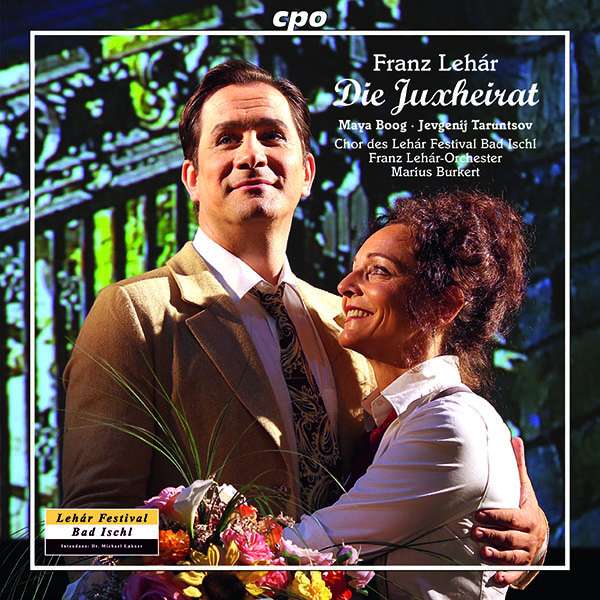
The CD cover for Lehár’s “Die Juxheirat,” 2016 live recording on cpo.
I admit right away that I have a complicated relationship with cpo and Bad Ischl recordings. Because of negative past experiences I had vowed to myself to never ever buy or review another cpo operetta release. But the plot of Die Juxheirat is simply too great for me to pass by, even if my hopes for an adequate interpretation from Ischl are limited.
Why am I so enamored with the story Julius Bauer constructed? A quick summery of the action will give you a good idea.

The Breakers, the summer home of Cornelius Vanderbilt II, located in Newport, Rhode Island. It was built in 1893. (Photo: CC-BY-SA-3.0/Matt H. Wade at Wikipedia)
It’s set in Newport, Rhode Island, 100 kilometers south of Boston in the villa of US billionaire Thomas Brockwiller. We encounter his daughter Selma who is recently widowed. Frustrated with her experiences as a wife she decides to never marry again. Actually, she goes one step further and starts a political organization called LVM together with her friends Edith, Phoebe and Euphrasia. LVM stands for “Los vom Manne,” which translated as “Get Away From All Men.” Today, you’d probably call it a radical queer feminist group.
The goal of the organization’s female members is clear. Things get complicated, though, when Phoebe and Euphrasia meet the dashing new chauffer Philly Kaps and recognize in him the man who had promised them both marriage in the past. When Philly smoothes out things with Phoebe and makes peace again with her, Euphrasia gets furious and has him arrested by the police.
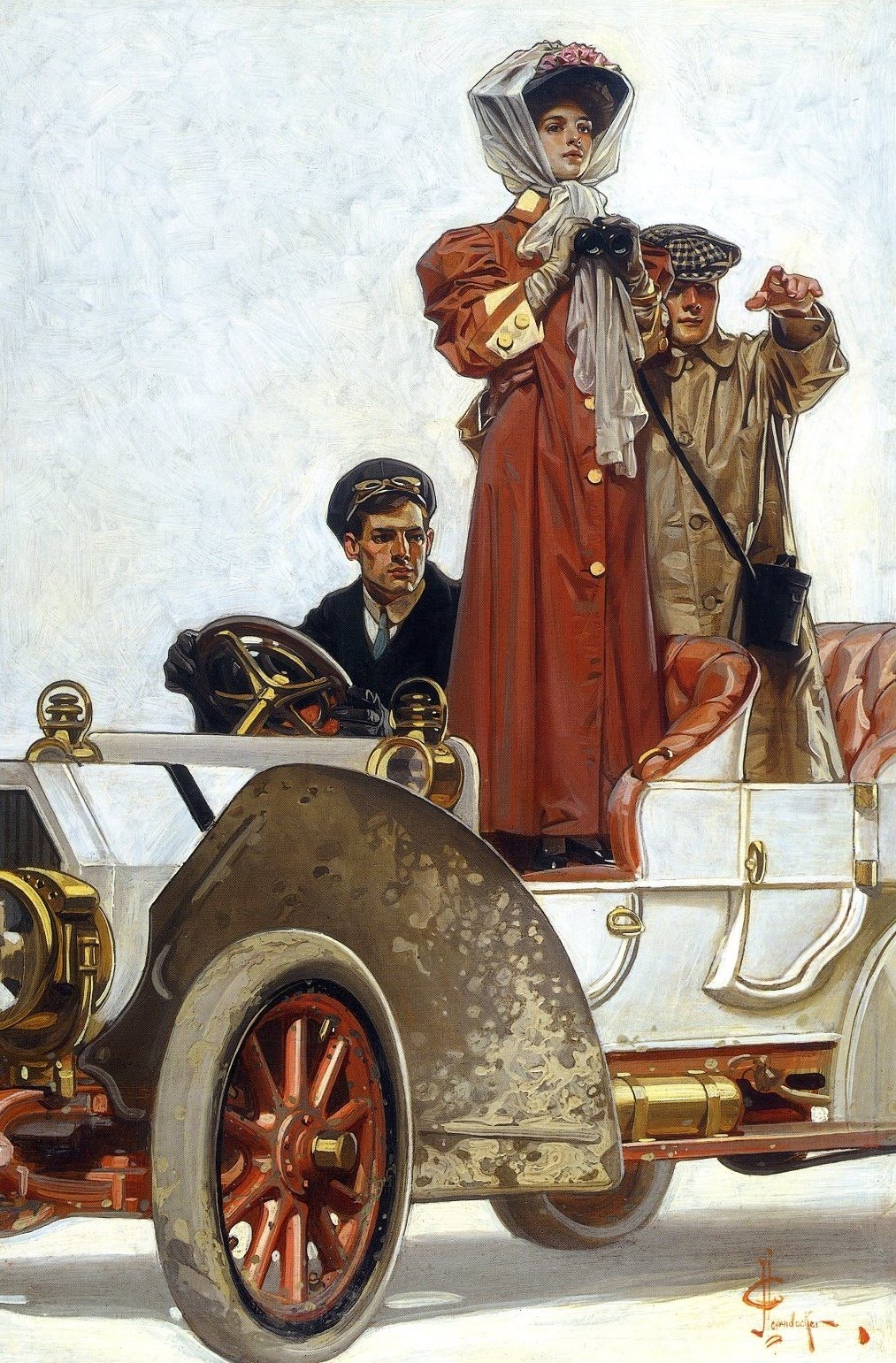
Painting by J. C. Leyendecker of a chauffeur escorting a lady around.
Meanwhile, father Brockwiller would like to marry his daughter off to a business associate, the German-American Harold von Reckenburg. Obviously, Selma is opposed to such an idea. She prefers to stay single. Forever. No more men to boss her around, she says.

Votes for Women poster, 1909.
Harold’s twin sister Juliane von Reckenburg hears of Selma’s refusal to marry and decides to play an evil trick. Because she was once engaged to a man who left her for Selma when he heard of the size of Selma’s dowry. Under a false name Juliane joins the LVM club and mentions, in passing, that Harold’s sister has been known to dress up as a man. And that this cross-dressed twin sister has been touring around in her brother’s name to check out potential brides for him.
The LVM ladies find this story highly amusing and very emancipated. So Selma decides to receive the pseudo-Harald in her boudoir – believing him to be a woman. Obviously, what might then happen is a heterosexual man’s wet ‘lesbian’ dream.
Father Brockwiller, not informed about this gender confusion, is delighted to hear that his daughter is meeting the ‘man’ he has selected for her.
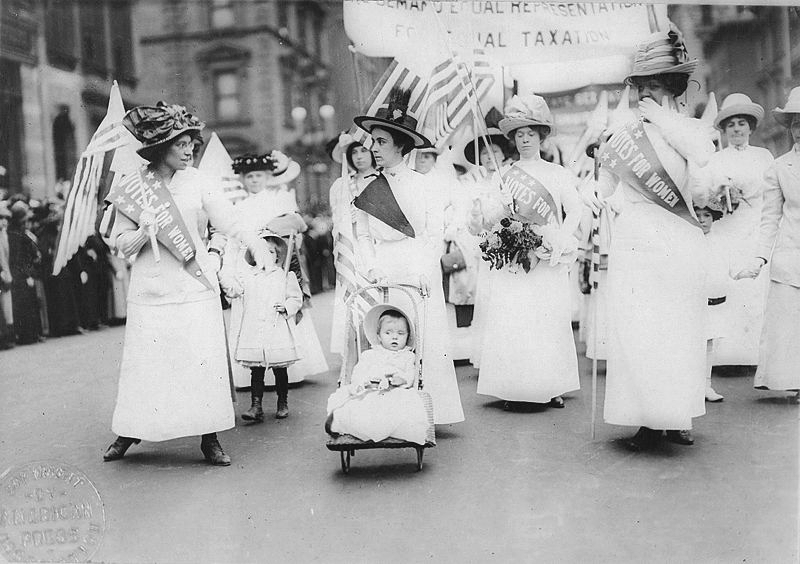
Suffragette demonstration in New York City, 1912.
In act 2, Eurphrasia regrets having had the charming chauffer arrest and visits him in prison, helping him get out of there. Back at the Browiller villa, Philly encounters the real ‘male’ Harold and gives him pointers as to how a man can best win a lady’s heart. For demonstrational purposes, Philly asks Harold to participate in a little role playing: Harold must pose as a woman so that Philly can demonstrate his seduction tactics. Obviously, this is a gay man’s wet dream, and (seen from today’s perspective) also a delight for heterosexual women who have recently discovered the joys of watching man-on-man action in porn and elsewhere.
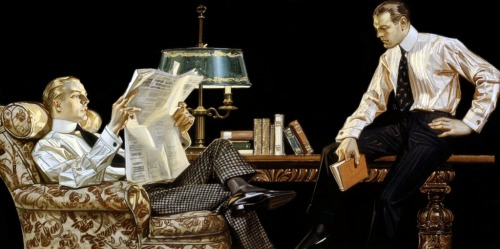
Classic man-on-man action as imagined by J. C. Leyendecker at the beginning of the 20th century.
When Selma sees this seduction lesson she is convinced that the ‘Harold’ she sees is his cross-dressed sister. Appalled and fascinated by the way the gentlemen think a modern emancipated woman can be treated, she invites the pseudo-Harold to kiss her in public, with witnesses. An unheard of act for any ‘respectable’ woman in 1904. As her shocked father enters, she declares that this is her engagement kiss. She demands an immediate wedding ceremony to ridicule Philly’s how-to-handle-a-woman tactics. And to ridicule her father’s demand for her to marry again. Brockwiller’s friends, sheriff Huckland, does the honors, and Selma and ‘Harold’ are man and wife in no time. Selma thinks this is the best feminist joke ever. A same-sex wedding in the United States of America, 111 years before this was legally possible.
At the subsequent party, Juliane appears as Countess von Reckenburg and informs everyone of the true sex of the Selma’s husband. Selma is shocked. A classic ‘tragic’ act 2 finale.
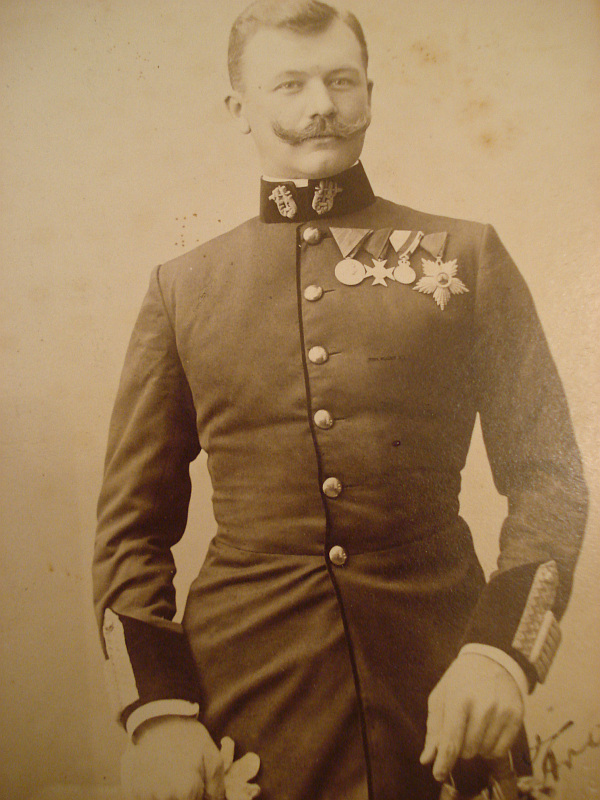
The young Franz Lehár, at the start of his career.
It’s followed by a third act set in a hunting lodge in the mountains, three months later. The LVM has been dissolved, everyone has married except Selma. And everyone arrives at the lodge for their honeymoon. Selma is not exactly thrilled to see all these lovebirds all day long. And she starts wondering if – maybe – marriage might not be a good idea after all. Isn’t everyone else happy with it, even the ladies of her former LVM club?
When Harold eventually arrives with the divorce papers Selma tears them apart, and when Harold declares his true love for her as a strong and independent woman, she changes her mind about staying single forever. She falls into his arms. Happy end. This is, after all, a show written by men in 1904. Today’s radical queer feminists might have come up with a slightly different ending.
When you look at the original reviews, they all praise the “decency” of the story and the fact that it was not a typical “nonsense” farce, as most operettas of the era were apparently considered. The Neue Freie Presse calls Die Juxheirat an “Operettenbuch voll aktuellen Witzes und zeitgenössischer Satyre,“ i.e. a libretto full of contemporary wit and satire.
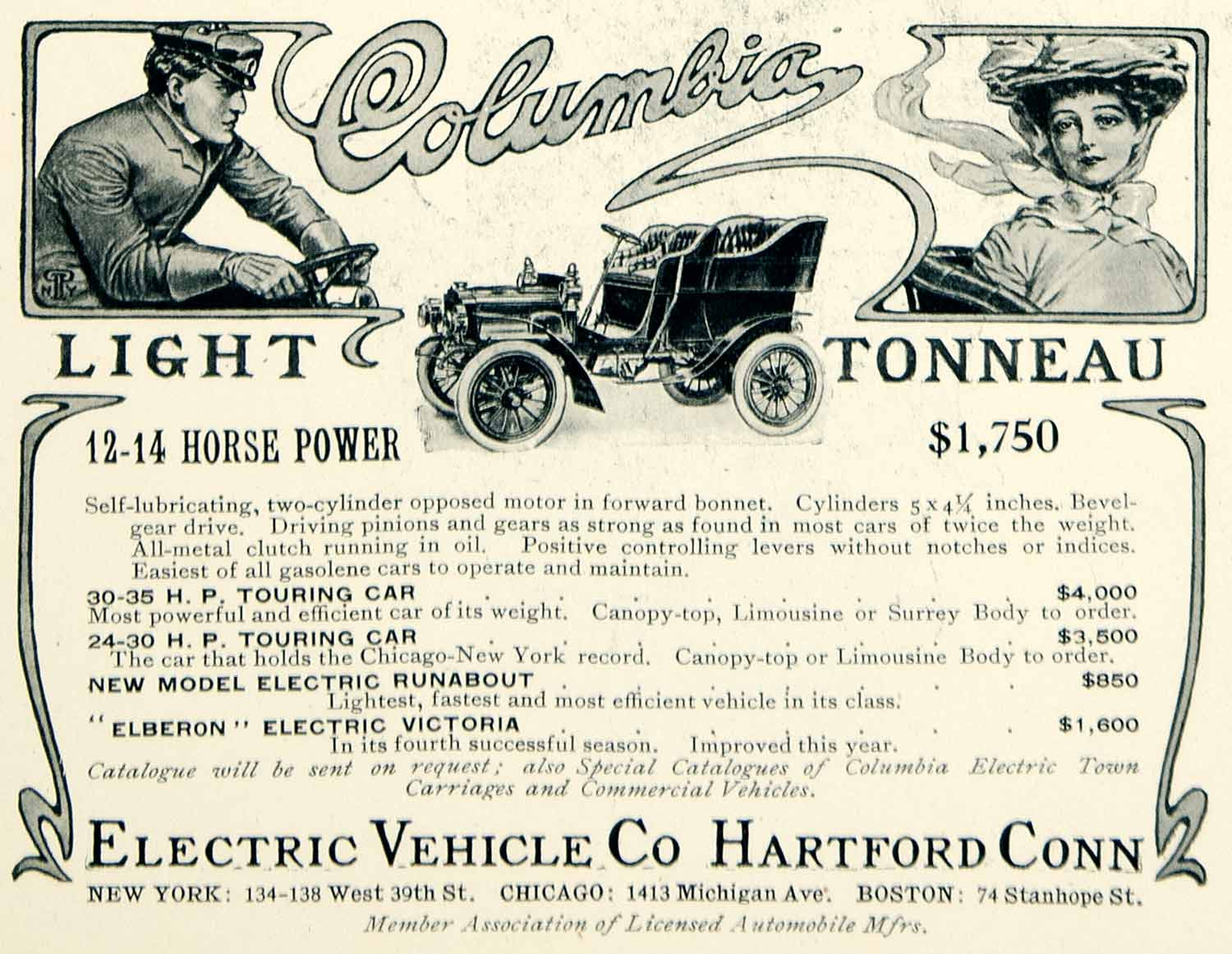
1904 Ad Electric Vehicle Columbia Light Tonneau Automobile Brass Era Car.
The role of the chauffer was originally played by Alexander Girardi, Vienna’s super star and the original Jonathan in Millöcker’s operetta. Since Girardi was a famous comedian, it’s clear that the seduction lesson between Philly and Harold was one of the comic highlights of the show. The newspaper praises Lehár’s “Slavic melodic opulence” and notes his tendency to write “operatically” rather than typical operetta music. It also praises his masterful orchestration and the catchiness and rhythmic drive of the dance tunes. Which more or less sums up Lehár’s entire later career. According to the Neue Freie Presse, the ladies “LVM” quartet in act 1 was the musical highlight of the show as well as Girardi’s third-act couplet. (A special mention also goes to a dance trio in act 2 – again involving Girardi – in which Schopenhauer and other woman-hating philosophers are turned upside down. The reviewer claims that instead of Johann Strauss one dances Richard Strauss here, I assume this is meant as a compliment.)
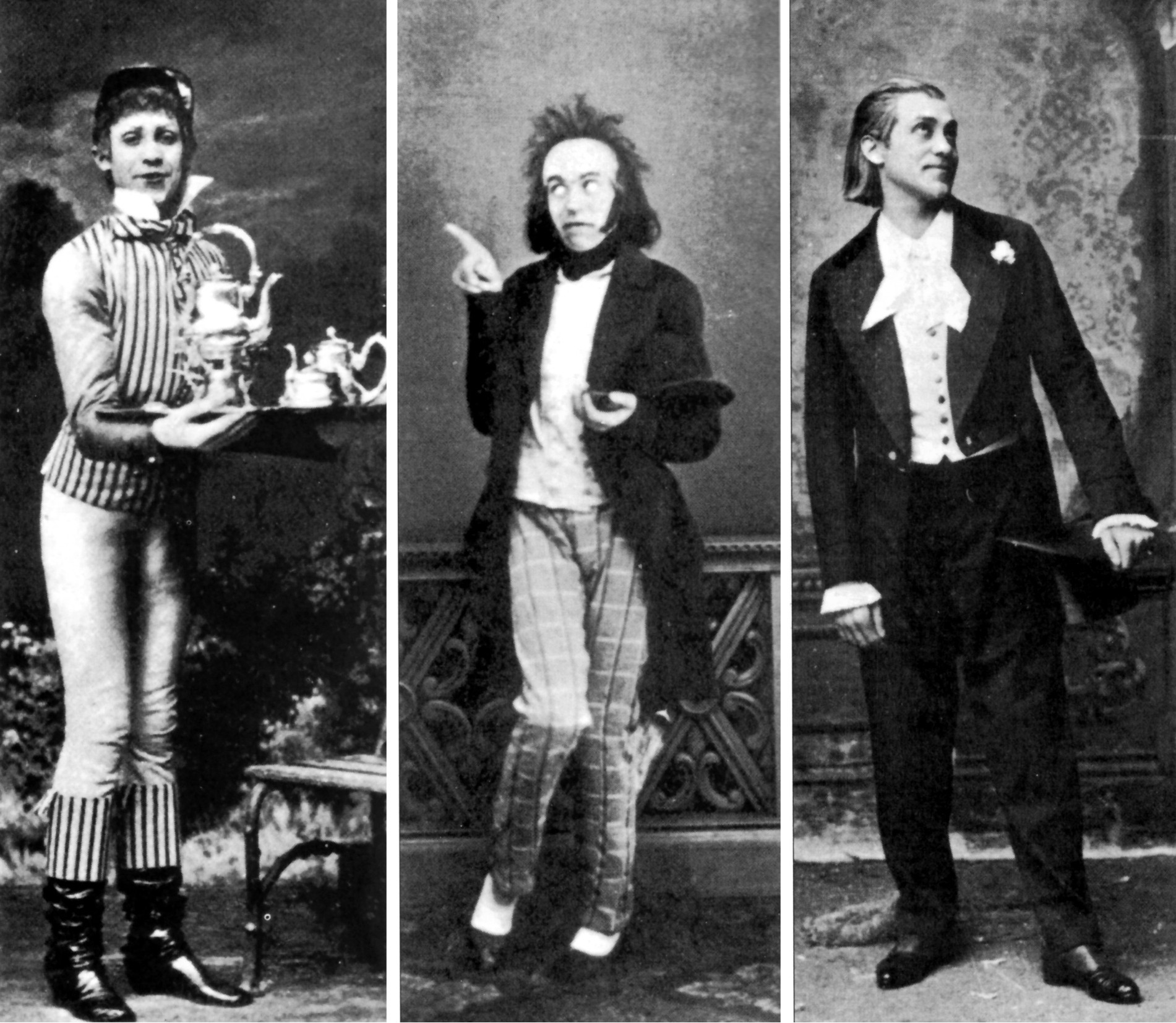
Operetta star Alexander Girardi, in three historical roles.
The Viennese production ran for only 39 performances, follow-up productions in Munich and Berlin were equally short lived. In 1905 a set of gramophone recordings was made with the illustrious world-premiere cast. Judging by orchestra material found, it seems that the Austrian radio station RAVAG performed highlights in 1936, too. And, then, Michael Lakner as departing director of the Lehár festival in Ischl presented the show in a semi-staged version for two (!) performances in his last season in 2016. The reviews were quite enthusiastic. Der Neue Merker notes: “When presented by a good ensemble with drive and comic timing the show is a pleasure. And Ischl certainly has a great ensemble: Gerhard Ernst (Thomas Brockwiller), Maya Boog (Selma), Alexander Kaimbacher (Arthur Brockwiller), Sieglinde Feldhofer (Phoebe), IliaVierlinger (Edith),Rita Peterl (Euphrasia), Jevgenij Taruntsov (Harold von Reckenburg), Anna-Sophie Kostal (Juliane), Christoph Filler (Philly Kaps), as well as Tomaz Kovacic, Matthias Schuppli and Wolfgang Gerold sing, speak and dance through the show with such ease that it’s fun to watch and listen to. There is not a single weak link, everyone is in excellent voice and brings the necessary bubbly joy along. One should consider that all roles have large portions of dialogue to deliver and vast amounts of music. The soloists learned it for two performances – and a radio broadcast. They present the show with full energy, and it’s a shame that there are not more performances. At least a CD will be out for the opening of the 2017 Lehár festival.”
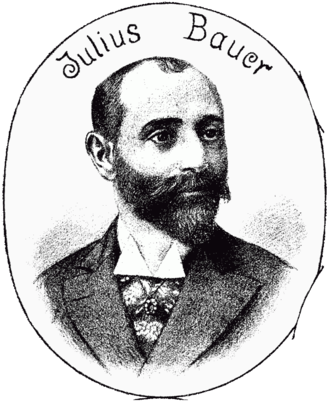
The young Julius Bauer as show in the 1893 issue of “Der Floh.”
Well, that 2017 festival is about to start. And here is the CD of Juxheirat, “brilliantly” conducted by Marius Burkert, as Online Merker states. To not spoil the fun here, I shall refrain from reviewing the actual recording and stick to the historical background. And leave it up to you whether you wish to buy the double disc. I certainly did! (In a worst case scenario I shall simply imagine what this show could look and sound like when a gender bending director like Barrie Kosky gets his hands on it and the likes of Katharine Mehrling, Serkan Kaya and Adam Benzwi take over.)
For more information about the CD, click here.
